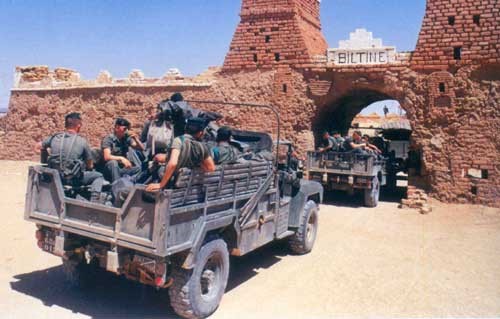Andrew McGregor
July 14, 2011
Indications from Paris that France may be ready to bring an end to Opération Épervier, its 25-year-old military mission in Chad, have been welcomed by both the government of President Idriss Déby and General Mahamat Nouri, commander of one of Chad’s leading rebel movements. The French mission has both a land and air component and is based in two places; the airport at the capital of N’Djamena in the west and Abéché (former capital of the Sultanate of Wadai) in the east. Three Mirage 2000 jet fighters form part of the mission as do roughly 1,000 troops, mostly of the French Foreign Legion.
French Foreign Legion Unit in Chad
During talks with Chad in Paris on July 5, French Foreign Minister Alain Juppe suggested that there was no longer any reason for France to continue keeping roughly 1,000 French troops in Chad. A senior official of the Chadian Foreign Ministry said N’Djamena had no objections: “Chad is prepared to begin negotiations with French authorities as early as next week… Épervier has been in Chad for 25 years. It is time to review this structure to adapt to the current context” (AFP, July 6).
General Mahamat Nouri, the leader of the rebel Alliance nationale pour le changement démocratique (ANCD) said he was “very pleased” with the remarks of the French Foreign Minister, acknowledging that the rebels “would probably be in power were it not for the French troops.” The general also hailed what he described as the French “determination to pursue a transparent, credible foreign policy in line with its historical and cultural values” (AFP, July 6). Nouri, along with other Chadian rebel leaders living in Sudan, was expelled to Doha last year after the rapprochement between N’Djamena and Khartoum.
Chad was formed as a territory of France after the conquest of a number of small sultanates and the expulsion of the Libyan Sanusis in the early years of the 20th century. The territory eventually gained independence in 1960, though economic and security ties with France remained strong.
Opération Épervier (Sparrowhawk) began in 1986 to supply French military assistance to the regime of Hissène Habré when the Libyan army tried to seize the uranium-rich Aouzou Strip in northern Chad. When General Déby overthrew the increasingly brutal Habré in 1990 the French mission did not interfere. Habré fled to Senegal where he remained safe since Senegal had no law regarding “crimes against humanity” on its books and also wanted to avoid the considerable cost involved in trying a former head-of-state for the murders of over 40,000 individuals. Senegal recently decided to extradite Habré to Chad but reversed itself at the urging of UN human rights chief Navi Pillay, who warned Habré could be tortured if returned to Chad. Belgium has now offered to try Habré under its “universal competence” law (Reuters, July 11; AFP, July 11).
Much has changed in Chad since 2008, when Déby and his loyalists fought off a Sudanese-supported rebel invasion in the streets of N’Djamena with intelligence and logistical assistance from the French military. Deby’s new confidence no doubt arises from the pact he signed with Sudan’s Omar al-Bashir, in which both sides pledged to end their proxy war along the Chad-Sudan border. Though such pacts have collapsed in the past, this time Sudan is likely to be consumed by its own internal problems for a considerable time following the independence of South Sudan. Déby has also worked to fortify N’Djamena to prevent a repeat of the 2008 rebel assault. A three-meter deep trench has been built around the city to force all traffic to enter through fortified gateways. Many of N’Djamena’s trees have also been cut down to prevent rebels from using them to block roads (Reuters, March 3, 2008; BBC, March 4, 2008).
During last August’s celebration of 50 years of Chadian independence, Déby suggested it was time to begin charging France for maintaining a military presence in Chad. According to the President, Operation Epervier no longer played a role in Chad aside from “providing some healthcare for the sick and logistical support in case of an attack somewhere… We have no defense accord with France. And the presence of Épervier has nothing to do with our independence or our sovereignty. Épervier is not here to help or support a government or a regime.” (Le Figaro, August 26, 2010).
Déby may face new security challenges in northern Chad, where a trade system based on supplies from Libya has broken down, causing severe shortages of many commodities in the region (Le Monde, July 7). There are some 70,000 Chadian workers who have been expelled from Libya due to the civil war as well as fears of arms reaching Chadian insurgents and criminals from uncontrolled weapons depots in Libya.
There is also speculation that Déby is seeking to replace the historical relationship with France with a less intrusive economic partnership with China. Ties with China have been steadily increasing since 2006 and the China National Petroleum Corporation has just started operations at a joint venture oil refinery outside of N’Djamena (Xinhua, July 1).
In a related development, a French court has found four men guilty of “robbery leading to death without intention to kill” in the death of Déby’s son, Brahim Déby. A resident of Paris with previous convictions for drugs and weapons possession, Brahim Déby was attacked with a taser gun and covered in fire extinguisher foam in a 2007 robbery that prosecutors said had no political connection (Le Monde, July 7; Radio France Internationale, July 8).
This article was originally published in the July 14, 2011 issue of the Jamestown Foundation’s Terrorism Monitor.

